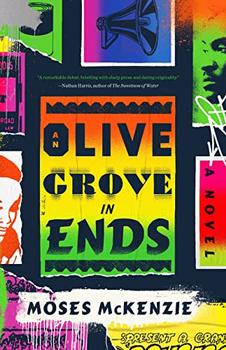Book Club Discussion Questions
In a book club? Subscribe to our Book Club Newsletter!
For supplemental discussion material see our Beyond the Book article, Bristol, England and our BookBrowse Review of An Olive Grove in Ends.
Please be aware that this discussion guide will contain spoilers!
- What does the "house-atop-the-hill" represent to Sayon and his mother?
- In Chapter 2, Sayon says "my mortality was as real to me as the soil I shovelled on to the aunts, uncles and cousins we buried…the funerals outnumbered even the weddings." How does his family history and their reputation in Ends impact his life as he comes of age?
- Each chapter begins with an epigraph that is a verse from the Bible or the Quran, or a Jamaican proverb. Why do you think the author decided to do this, and how does it affect the reading experience for you?
- Moses McKenzie is of Jamaican descent, but grew up in Bristol, UK. How do you think his relationship to heritage and culture influenced this novel?
- Sayon and Shona both grow up as children of pastors, but their relationship with religion is strikingly different. Why do you think this is?
- In Chapter 14, Sayon is faced with a decision: leave his family and join the church, or risk losing the love of his life and his freedom. Would you have made the same choice that he does?
- How does religion (or lack thereof) influence Sayon's decisions throughout the novel?
- After Sayon moves in with Shona and her family, they drift further apart. Why do you think this is? How does Pastor Lyle contribute to their estrangement?
- Sayon is only a year older than Cuba, but we see him acting as a protector to Cuba throughout the novel. Why do you think Sayon feels such a responsibility to keep Cuba safe?
- In Chapter 30, we learn that Hakim and Elia's bakery is in jeopardy after they receive an eviction notice from their landlady due to the "area changing and keeping up with the times." Later, the "house-atop-the-hill" that Sayon has idolized since childhood is sold with plans to turn the home into apartments. How does gentrification impact the characters' decisions and their community?
- Do you think Sayon should've told Shona what he did from the beginning? If he had been honest and told her before her father could, would anything have changed?
- In Chapter 38, we see Sayon convert to the Islamic religion. What does he find in Islam that he couldn't find in Christianity?
- Why do you think Cuba disappears from Ends?
- In Chapter 35, Sayon states "there is no such thing as a happy ending." Do you think he ultimately achieves his happy ending?
Unless otherwise stated, this discussion guide is reprinted with the permission of Back Bay Books.
Any page references refer to a USA edition of the book, usually the trade paperback version, and may vary in other editions.
